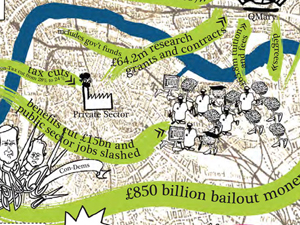A liberatory UC, run by and for all the people, is not only possible—it is a critical part of a planetary youth movement that is enacting true democracy in public squares and parks. We have faith that the weapons at our disposal will allow us to play our part. We have faith that these weapons will allow us to peacefully tear down the old edifice and build this new university from the ground up. Our pedagogy is our main weapon, and on a daily basis, we see that it is neither blunt nor ineffective. These are our main pedagogical principles—intuitions more than ideologies, bonds more than guidelines, dreams rather than demands. These principles aim at cracking through the crumbling structure of the university at its base. Through these principles, we will take part in a guerrilla campaign to bring all of the people back into the university.
Universities in Question
smartAction
Images from an art exhibition inspired by the 2010–2011 University of Puerto Rico student Movement.
La Performatividad Colectiva como Arte Publico: Acción dentro de la Huelga de la Universidad de Puerto Rico / Collective Performance as Public Art: Action inside the University of Puerto Rico’s Strike
In April 2010, the University of Puerto Rico experienced a moment of political convulsion due to a series of measures and budget cuts that the administration tried to implement. These events moved the students to demand a reason for these budget cuts. After not getting any clear or valid answers from the administration, the student body organized a series of protests that lead to an almost two-month long strike. My paper is mainly focused on the artistic manifestations that resulted from the strike. These, from our perspective, can easily ft into what is considered public art, may them be intended as such or not, because they transform the street into a place of dialogue and relationships.
Countermapping the University
Appropriating the genre of the campus map, graduate students at Queen Mary University London and University of North Carolina Chapel Hill have produced a countermap of the university. Elegant in design, yet multi-purposed, their mapping of alternative uses and critiques takes the form of a poster-sized doubled sided print which locates the university within its larger societal force field (the map’s front side), and stages an arena for playing that field by means of a board game (which appears on the reverse side). In sharp contrast to the political geography of curricula intended to assimilate students to an already settled matter and progress-toward-a-degree, an unproblematic temporal beat measured by accumulated credit-hours, the critical cartographical work of this collective reallocates the energies of their seminars and research to produce alternate forms of knowledge and means for its legitimation.
Lateral Moves – Across Disciplines
“Lateral Moves – Across Disciplines” is an edited conversation with Randy Martin and three members of the Cultural Studies Praxis Collective (CSPC): Miriam Bartha, Diane Douglas, and Kanta Kochhar-Lindgren. The original conversation took place at the University of Washington’s Simpson Center for the Humanities in 2007. The transcript of the conversation was reworked and revised by the interlocutors and Bruce Burgett, the co-director (along with Kanta Kochhar-Lindgren) of the CSPC. The document as a whole surfaces and addresses a series of questions about interdisciplinarity, cultural studies, and the humanities; about creativity, agency, and advocacy; about different forms of professional, disciplinary, and civic education; and about knowledge, labor, and organizing.
